 Global ambassadors of ecotourism gather in Nanjing
Global ambassadors of ecotourism gather in Nanjing
 Taiwan woman marries into Kazak family, 100 sheep plus a flat as dowry
Taiwan woman marries into Kazak family, 100 sheep plus a flat as dowry
 College girls take graduation photos under water in Chongqing
College girls take graduation photos under water in Chongqing
 Cartoon: Xi and football
Cartoon: Xi and football
 Chinese influence sweeps ROK
Chinese influence sweeps ROK
 Post-90s beauty boxer grapples four men
Post-90s beauty boxer grapples four men
 3,000-year-old tea town through lenses
3,000-year-old tea town through lenses
 22 archaeological sites along Silk Road in China
22 archaeological sites along Silk Road in China
 Football babies, Samba dancers embrace 'World Cup'
Football babies, Samba dancers embrace 'World Cup'
 Beautiful scenery along China’s Grand Canal
Beautiful scenery along China’s Grand Canal
BEIJING, July 7 -- Chinese President Xi Jinping on Monday underscored the intractability of history as the nation commemorated the start of the War of Resistance Against Japanese Aggression 77 years ago.
"History is history and facts are facts. Nobody can change history and facts," Xi said when addressing a crowd of over 1,000 people at the Museum of the War of the Chinese People's Resistance Against Japanese Aggression in the outskirts of Beijing.
"Anyone who intends to deny, distort or beautify the history of aggression will never be tolerated by Chinese people and people of all other countries," he said, referring to widespread concerns that Japan is trying to distort the history of the war.
The War of Resistance Against Japanese Aggression started in 1937 and ended with Japan's World War II defeat in 1945.
"It's a pity that a small minority of people still ignore iron-clad history and the fact that tens of millions of innocent people lost their lives in the war," he said.
This minority has repeatedly denied or even beautified the history of aggression, undermining mutual trust among states and creating regional tensions. Such behavior has been strongly condemned by the world's peace-loving people, said Xi.
"History is the best textbook, as well as the best dose of sobriety," Xi said, adding that Chinese people who remember the torment of war have always been in pursuit of peace.
"History tells us that any aggression by force is doomed to fail," Xi warned. "China will unswervingly pursue the road of peaceful development and hopes all other countries in the world can take the same road."
Xi's remarks came after Japan's reinterpretation of its pacifist Constitution last week.
Japanese Prime Minister Shinzo Abe's cabinet endorsed a reinterpretation of its pacifist Constitution on July 1 for the right to collective self-defense, fueling concerns over Japan's return to its past militarism.
Previously, right-wingers in Japan initiated a series of provocations, from the "nationalization" of China's Diaoyu Islands by the former Japanese government to Abe's ridiculous visit to the Yasukuni Shrine.
Japan invaded northeast China in September 1931. But historians agree that Japan's full-scale invasion started on July 7, 1937, when a crucial access point to Beijing, Lugou Bridge, was attacked by Japanese troops.
Around 35 million Chinese soldiers and civilians were killed or injured by Japanese troops during the war against Japanese aggression (1937-45), with at least 300,000 people slaughtered in the Nanjing Massacre alone.
Xi said the Chinese nation at that time faced the most direct threats, prompting "all ethnic groups, classes, parties, social organizations and patriots from all circles, as well as Hong Kong, Macao and Taiwan compatriots and overseas Chinese, to unite and throw themselves into a grand struggle which meant life and death for the Chinese nation."
He added that the Communist Party of China had also shouldered its historical responsibilities by calling for a national united front against Japanese invasion.
Calling the Chinese people's resistance against aggression by the Japanese a "heroic ode" in which Chinese patriots "bathed in blood," Xi said Monday's gathering should serve to recall history, commemorate martyrs, cherish peace and sound a warning for the future.
The Chinese president also unveiled a sculpture commemorating the start of China's War of Resistance Against Japanese Aggression in the company of two veteran Chinese soldiers, one from the Communist Party of China and another from the Kuomintang, who took part in the war, as well as with Chinese teenagers.
The sculpture is based on a military medal specially designed for veteran soldiers who fought in the war from 1937 to 1945.
"The inauguration of this sculpture commemorates those who devoted their lives to fighting for national independence and freedom as well as those who made great contributions to peace and justice, and to console the victims of the war," Xi said.
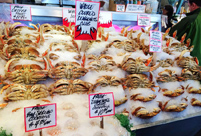 'Seattle's soulmate' - -Pike Place Market
'Seattle's soulmate' - -Pike Place Market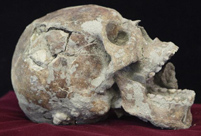 Human skeletons of more than 1,600 years old
Human skeletons of more than 1,600 years old BFA goddess poses for graduation photos
BFA goddess poses for graduation photos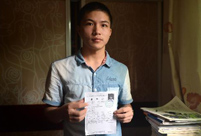 Separate college entrance exam
Separate college entrance exam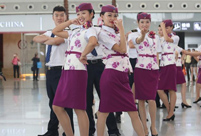 Flash mob dance
Flash mob dance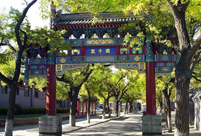 Featured hutongs in Beijing
Featured hutongs in Beijing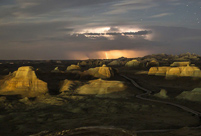 Picturesque scenery of Ghost City
Picturesque scenery of Ghost City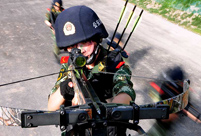 Female special assault team in training
Female special assault team in training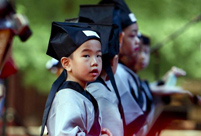 Children attend First Writing Ceremony
Children attend First Writing Ceremony Chengdu police use social media to boost recruitment
Chengdu police use social media to boost recruitment Secrets unveiled in restoration of the 800-yr-old Buddha
Secrets unveiled in restoration of the 800-yr-old Buddha Heavenly path in Chongli grassland
Heavenly path in Chongli grassland Happy Birthday to "Yuanzai"
Happy Birthday to "Yuanzai" China's manned submersible Jiaolong opens to public
China's manned submersible Jiaolong opens to public Roast Duck Restaurant celebrates 150th anniversary
Roast Duck Restaurant celebrates 150th anniversaryDay|Week|Month